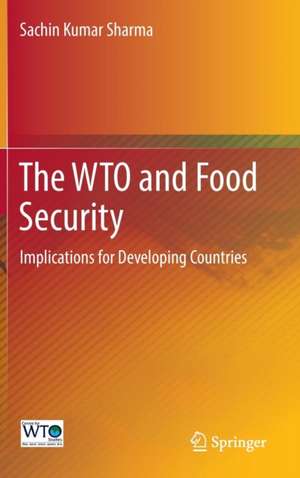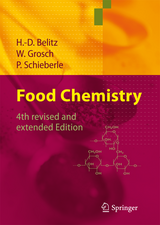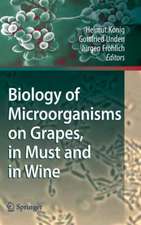The WTO and Food Security: Implications for Developing Countries
Autor Sachin Kumar Sharmaen Limba Engleză Hardback – 7 oct 2016
| Toate formatele și edițiile | Preț | Express |
|---|---|---|
| Paperback (1) | 724.63 lei 6-8 săpt. | |
| Springer Nature Singapore – 15 iun 2018 | 724.63 lei 6-8 săpt. | |
| Hardback (1) | 730.65 lei 6-8 săpt. | |
| Springer Nature Singapore – 7 oct 2016 | 730.65 lei 6-8 săpt. |
Preț: 730.65 lei
Preț vechi: 891.04 lei
-18% Nou
Puncte Express: 1096
Preț estimativ în valută:
139.85€ • 151.96$ • 117.55£
139.85€ • 151.96$ • 117.55£
Carte tipărită la comandă
Livrare economică 21 aprilie-05 mai
Preluare comenzi: 021 569.72.76
Specificații
ISBN-13: 9789811021787
ISBN-10: 9811021783
Pagini: 241
Ilustrații: XXXI, 218 p. 44 illus.
Dimensiuni: 155 x 235 x 16 mm
Greutate: 0.53 kg
Ediția:1st ed. 2016
Editura: Springer Nature Singapore
Colecția Springer
Locul publicării:Singapore, Singapore
ISBN-10: 9811021783
Pagini: 241
Ilustrații: XXXI, 218 p. 44 illus.
Dimensiuni: 155 x 235 x 16 mm
Greutate: 0.53 kg
Ediția:1st ed. 2016
Editura: Springer Nature Singapore
Colecția Springer
Locul publicării:Singapore, Singapore
Cuprins
Chapter 1. Introduction.- Chapter 2. Domestic Support Under Agreement on Agriculture.- Chapter 3. Food Security and Agriculture Sector.- Chapter 4. China: Product Specific Support to Wheat under WTO Regime.- Chapter 5. Egypt: Product-Specific Support to Wheat Under WTO Regime.- Chapter 6. India: Product specific Support to Wheat and Rice Under WTO Regime.- Chapter 7. Indonesia: Product specific Support to Rice under WTO.- Chapter 8. Jordan: Product specific Support to Wheat under WTO Regime.- Chapter 9. Kenya: Product specific Support to Maize Under WTO Regime.- Chapter 10. Morocco: Product specific Support to Wheat Under WTO Regime.- Chapter 11. Pakistan: Product specific Support to Wheat Under WTO Regime.- Chapter 12. Tunisia: Product specific Support to Wheat Under WTO Regime.- Chapter 13. Turkey: Product specific Support to Wheat under WTO Regime.- Chapter 14. Zambia: Product specific Support to Maize under WTO Regime.- Chapter 15. Zimbabwe: Product specific Support to Maize under WTO Regime.- Chapter 16. Conclusion and Way Forward.
Notă biografică
Sachin Kumar Sharma is working at the Centre for WTO Studies, Indian Institute of Foreign Trade, Delhi. He completed his PhD in Economics from Jawaharlal Nehru University, New Delhi. He has undertaken research on various issues related to WTO, International trade and agriculture negotiations. He has authored many reports for the Government of India on various issues related to Green box, India’s domestic support notifications, food security, Agreement on Agriculture, G-33 proposal on food security, among others. Currently, he is actively engaged on issues relating to food security and WTO. His research interests include WTO, subsidies, food security, free trade agreement, CGE modelling and agriculture negotiations.
Textul de pe ultima copertă
This book examines the public stockholding policies of selected developing countries from the perspective of WTO rules and assesses whether the provisions of the Agreement on Agriculture (AoA) could hamper these countries’ efforts to address the challenges of food security. Further, it highlights the need to amend the provisions of the AoA to make WTO rules just and fair for the millions of people suffering from hunger and malnutrition in developing countries. This book highlights that 12 countries namely China, Egypt, India, Indonesia, Jordan, Kenya, Morocco, Pakistan, Tunisia, Turkey, Zambia and Zimbabwe are facing or will face problems in implementing the food security policies due to the provisions under AoA. These provisions need to be amended for permitting developing countries to address hunger and undernourishment. Progress in WTO negotiations on public stockholding for food security purposes are also discussed and analysed. The findings of this study greatly benefit trade negotiators, policymakers, civil society, farmers groups, researchers, students and academics interested in issues related to the WTO, agriculture and food security.
… is an important input into the debate surrounding the attempts of several countries to negotiate a change in these rules in the face of strong resistance from those that aver that trade liberalisation is a sine qua non for food security ...
- Rajeev Kher, Member, Competition Appellate Tribunal and Former Commerce Secretary, Government of India… offers a timely analysis, with detailed supporting data, of one of the most contentious issues in the WTO: the attempt to limit much-needed policies to address food security in developing countries ...
- Timothy A. Wise, Global Development and Environment Institute, Tufts University, USA
Price support schemes used by the US, UK and the EU in the past, are currently being used by atleast twelve large developing countries to ensure food and livelihood security for their poor farmers... This book analyses the problem in depth and provides solutions for the way forward. It is a valuable addition to the literature on the subject.
- Dr. Jayant Dasgupta, Former Ambassador of India to the WTO
…Highly recommended for international economists, policymakers and researchers who are interested in understanding the complexities involved in food security and international trade.
- Dr. Rajan Sudesh Ratna, UN ESCAP, Bangkok
- Rajeev Kher, Member, Competition Appellate Tribunal and Former Commerce Secretary, Government of India… offers a timely analysis, with detailed supporting data, of one of the most contentious issues in the WTO: the attempt to limit much-needed policies to address food security in developing countries ...
- Timothy A. Wise, Global Development and Environment Institute, Tufts University, USA
Price support schemes used by the US, UK and the EU in the past, are currently being used by atleast twelve large developing countries to ensure food and livelihood security for their poor farmers... This book analyses the problem in depth and provides solutions for the way forward. It is a valuable addition to the literature on the subject.
- Dr. Jayant Dasgupta, Former Ambassador of India to the WTO
…Highly recommended for international economists, policymakers and researchers who are interested in understanding the complexities involved in food security and international trade.
- Dr. Rajan Sudesh Ratna, UN ESCAP, Bangkok
Caracteristici
Examines the various provisions of Agreement on Agriculture (AoA) related to food security and highlights the progress in negotiations on public stockholding under Doha Round Provides a comprehensive analysis of food security policies in China, Egypt, India, Indonesia, Jordan, Kenya, Morocco, Pakistan, Tunisia, Turkey, Zambia and Zimbabwe from the perspective of the WTO rules Highlights the problems faced by developing countries in implementing food security policies due to existing provisions of the AoA Includes supplementary material: sn.pub/extras










